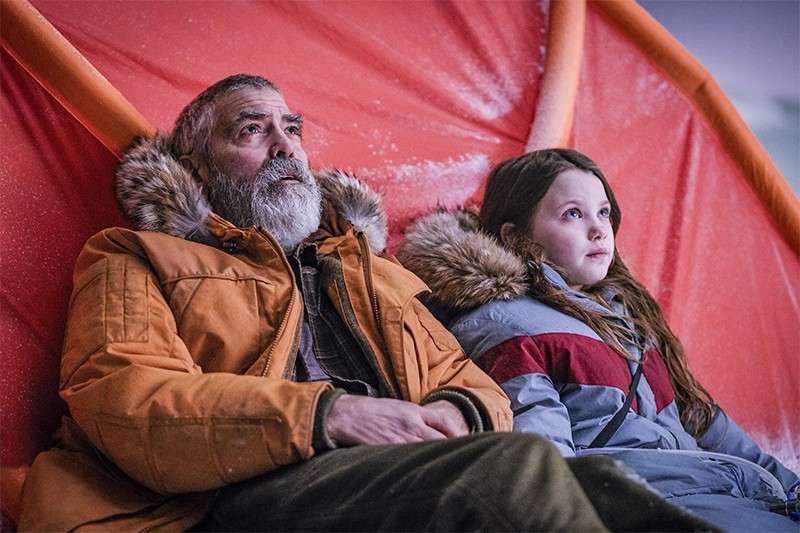10/12/2020
10/12/2020
Netflix is on a roll this year, with “Mank,””Ma Rainey’s Black Bottom,””Da 5 Bloods” and “The Trial of the Chicago 7” all garnering Oscar buzz. Well, hold onto your spacesuits for the latest - “The Midnight Sky.” George Clooney directs and stars in this feature film adaptation of Lily Brooks-Dalton’s novel “Good Morning, Midnight” and what he has done on both sides of the camera is astounding. He has managed to craft two intimate, connected stories set against the vastness of the cosmos and the white sprawl of the Arctic. He has turned in a tragic but yet hopeful tale grounded in, of all things, Earth’s destruction.

“The Midnight Sky” opens with a grizzled Clooney eating a microwaved meal in an empty cafeteria. He stares out into nothingness. It is 2049 and three weeks after an unclear disaster has befallen Earth. Clooney plays a cancer-ridden astrophysicist who is waiting out his days alone in an Arctic lab, trying to warn a returning spaceship about what has happened back home. Then he discovers he’s not alone - a girl is also in the outpost and needs looking after. Until now, he’s been drinking, playing chess against himself and undergoing transfusions. “I’m the wrong person,” he tells her.
To contact the astronauts, the scientist and the girl must travel across icy wastes to reach another station with a more powerful signal, in a sort of nod to “The Road.” The film alternates between the pair on Earth and the five-person crew in the heavens, the story switching from the white of Arctic snow to the blackness of space. Clooney’s filmmaking is unrushed, poetic and elegant, admiring beauty in its extremes - the ballet of manmade machines spinning slowly in space and the austerity of a blizzard in empty wilderness. Mark L. Smith’s script is equally spare, letting every word count. This is Clooney’s seventh outing as a director and there are artistic touches everywhere, like a tiny bright spacecraft against the darkness dissolving into a dark tent on an endlessly snowy plain. One scene in which blood droplets fl oat in zero gravity is horrific and beautiful at the same time. His camera lingers on the space station like a proud dad showing off his son’s toy model. Music by Alexandre Desplat is rich and evocative and the addition of Neil Diamond’s “Sweet Caroline” and Chris Stapleton’s “Tennessee Whiskey” feel natural and integral.
There’s even a nod to “On the Beach,” Stanley Kramer’s post-apocalyptic sci-fidrama. With five calm and capable astronauts in the sky and two characters in the Arctic, “The Midnight Sky” touches on themes of regret, parenting, fragility, familial responsibility and the conflict between love and career. It’s also a film about an environmental disaster whose final editing had to be done during a global pandemic.
By Mark Kennedy


